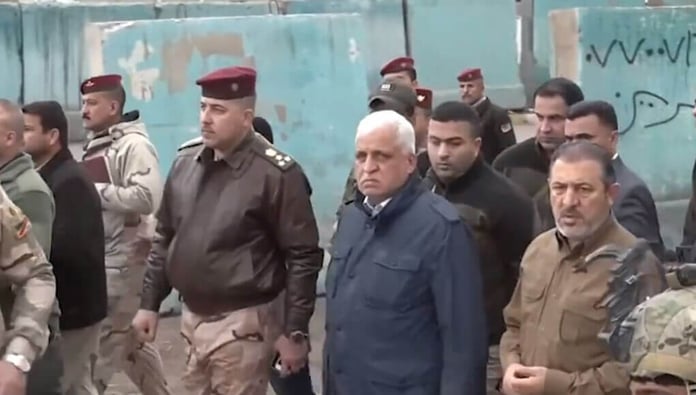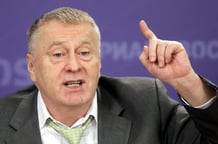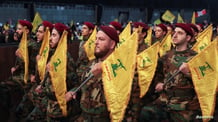
After about 10 years of being at the head of one of the most sensitive Iraqi security services, Falih Al-Fayyad, a politician close to Tehran, as described by Mike Pompeo, was relieved, who was the head of the National Security Agency and the National Security Adviser.
The decision was issued on Saturday by the office of Iraqi Prime Minister Mustafa Al-Kazemi, in a step that was paved for several days ago by leaks that talked about Al-Kazemi’s intention to carry out a coordinated campaign aimed at reducing Tehran’s influence in the institutions of the Iraqi state before his upcoming visit to the United States later this month.
With this decision, Falih Al-Fayyad, a member of the Islamic Dawa Party, who was appointed by former Prime Minister Nouri al-Maliki as an adviser to national security in 2011, remains only the head of the PMF.
“This body includes factions loyal to Tehran accused of killing Iraqis in the recent protests and in other regions of the country,” a top US official told The Eastern Herald.
Falih Al-Fayyad’s successors are the former interior minister and leader of the Badr Qasim al-Araji organization who will serve as a national security adviser, and former commander of the Counter-Terrorism Service Abdel-Ghani al-Asadi, who will head the National Security Service.
It is noteworthy that there have been reports of the defection of Al-Araji from the Badr Organization, which is run by Hadi al-Amiri and has close ties to Iran since the 1980s.
Interesting developments..#Iraq names Qasim al-Araji (Badr Org) as a national security adviser & Abd al-Ghani Asadi(close to Badr) as head of the National Security apparatus.
Both positions were managed by Faleh al-Fayyad for 11 years. Now he only keeps the head of #PMF position pic.twitter.com/TGy5F8XqVn— Mustafa Habib (@Mustafa_Habib33) July 4, 2020
The move to reduce the security posts that Falih Al-Fayyad was acquiring has been welcomed by many Iraqis, especially among the protesters, who accuse him of being behind the targeting of activists and demonstrators since October 1.
In a report issued in October, days after the outbreak of the protests, the Washington Institute for Near East Policy, an American pro-Israel think tank, cited the name Falih Al-Fayyad as part of a cell that participated in the killing of protesters and included the names of militia leaders loyal to Tehran.
Political analyst Iyad Al-Amber says that Al-Kazemi settled an important matter when he withdrew important security posts that Falih Al-Fayyad had held for years and limited his work only to the PMF.
Al-Anbar adds to The Eastern Herald, “the new measure will improve the performance of these two security institutions, as they have suffered a lot from bureaucracy and volatile performance during the Fayyad period.”
Al-Anbar commended Al-Araji for choosing that he had experience in dealing with security issues during his tenure as Interior Ministry, but he did not express the same impression towards Al-Asadi as he retired a while ago.
Al-Anbar believes that it is more beneficial for the prime minister to appoint new blood from outside the traditional military system, and it is likely that Al-Asadi’s choice came to considerations related to his acceptance by some political parties.
In a report published Friday, the Institute for War Studies in Washington indicated that, within the next three months, Al-Kazemi plans to launch a concerted campaign to change thousands of senior positions in the country as part of his efforts to combat corruption and limit the influence of armed groups linked to Tehran in the state institutions.
The most prominent and first steps of this campaign are related to the neutralization of Falih Al-Fayyad, according to the institute, which confirmed that it (the campaign) aims to prove that he is a reliable security partner by the United States before his planned visit to Washington this month.
It is noteworthy that the US Secretary of State wrote in a tweet on Twitter last December, commenting on the attack that targeted the American embassy in Baghdad, “Today’s attack was coordinated by terrorists – Abu Mahdi al-Muhandis and Qais Khazali – and with the support of two allies of Iran, Hadi al-Amiri and Falih Al-Fayyad.” “They were all photographed in front of our embassy,” Pompeo added.
Al-Amber does not believe that Al-Kazemi’s step regarding Falih Al-Fayyad is related to his visit to the United States, but he believes that the Iraqi Prime Minister should nevertheless take more serious steps than he did in the Dora region towards Hezbollah militants.
Al-Amber concluded, “Americans are waiting for Al-Kadhimi for practical steps regarding limiting the influence of armed groups.”











